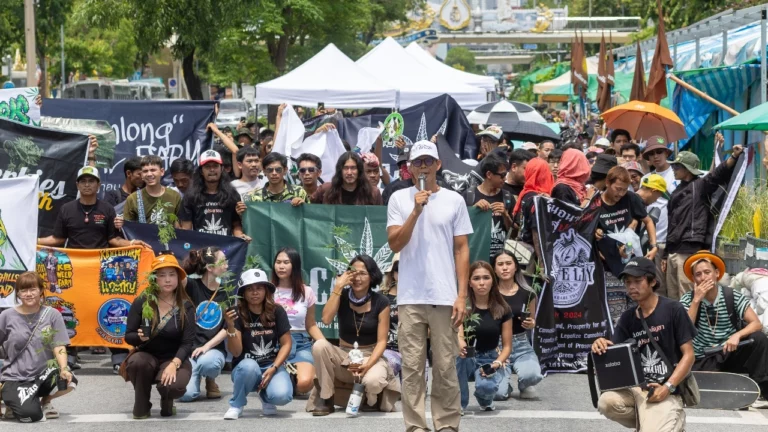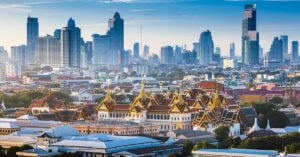Thailand cannabis group ends hunger strike over reclassification

Writing Thailand’s Cannabis Future Network concluded a hunger strike and peaceful demonstration against the reclassification of cannabis as an illegal narcotic. The group made this announcement through a statement on social media, expressing their concern over the government’s approach to cannabis regulation.
From July 8 to July 19, members of the network gathered in front of the Thai Government House, urging the government to adopt a scientific approach in determining cannabis-related laws. The group engaged in a ten-day hunger strike to highlight their cause.
In their statement, the network criticised the Minister of Public Health, Somsak Thepsuthin, accusing him of ignoring proper scientific processes and monopolising cannabis. They suggested that his actions were influenced by vested interests and questionable stakeholders.
“Despite our peaceful demonstration and hunger strike to express our intention for the government to form a committee to study the scientific facts about cannabis—a dignified and universal mechanism—the Minister of Public Health, Somsak Thepsuthin, has ignored even the proper processes. His objective appears to be monopolising cannabis.”
Deputy Prime Minister and Minister of Energy, Peeraphan Saleeratavipark, who chairs the Office of the Narcotics Control Board (ONCB), mentioned that he had not been consulted on the matter. He revealed that a meeting is scheduled for July 23, but he has commitments extending into August.
Peeraphan stated that he was unaware of the Ministry of Public Health’s intentions to reclassify cannabis and suggested that the ONCB provide an explanation for any such agenda.
Deputy Prime Minister and Minister of the Interior, Anutin Charnvirakul, indicated that the prime minister had called for discussions to understand the reasoning among stakeholders. Anutin’s emphasis on data-driven decisions aligns with the network’s proposals and stance.
Cannabis regulation
“With key figures in the process of potentially reclassifying cannabis, including the prime minister and the deputy prime minister, emphasising the need for reasoned and data-driven decisions, this aligns with the proposals and stance of our network,” the network stated.
The group expressed confidence that cannabis would not be reclassified as a narcotic under Somsak’s agenda. They emphasised the necessity of forming a committee for research to ensure that information is used appropriately in determining cannabis’ status.
However, as Somsak rejected the formation of such a committee, the network consulted with various parties to establish a people’s committee to gather and present data to the public and key decision-makers, including the prime minister and the deputy prime minister overseeing the ONCB.
The people’s committee will include academic institutions, particularly universities with cannabis studies programs, medical professionals working with cannabis, cultivators, and business operators. The network also plans to invite differing opinions, such as from the Rural Doctors Society or youth groups advocating for cannabis to be classified as a narcotic.
The aim is to establish the committee within seven days and expedite the study of various facts within two months to inform all parties and use the data to determine cannabis’ status.
“The Network for Shaping the Future of Thai Cannabis is committed to communicating this information to the public regularly. We believe that comprehensive public awareness is crucial in the process of determining the appropriate legal framework for cannabis,” the network stated.
In line with these objectives, the group announced the suspension of their gathering to proceed to the next steps. They affirmed their determination to ensure cannabis regulation under a legal framework, promising their supporters at Chamai Maruchet Bridge and elsewhere that they will strive for cannabis regulation by law, ensuring equal rights for all citizens under beneficial control measures.
“Lastly, we extend our gratitude to the media for covering various aspects of our network’s information, enhancing public understanding of cannabis. We believe that well-informed citizens will be powerful in accurately positioning cannabis,” the network concluded.
The network assured everyone that cannabis would not revert to being classified as a narcotic.
































